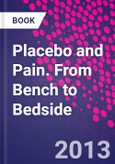The placebo effect continues to fascinate scientists, scholars, and clinicians, resulting in an impressive amount of research, mainly in the field of pain. While recent experimental and clinical studies have unraveled salient aspects of the neurobiological substrates and clinical relevance of pain and placebo analgesia, an authoritative source remained lacking until now. By presenting and integrating a broad range of research, Placebo and Pain enhances readers' knowledge about placebo and nocebo effects, reexamines the methodology of clinical trials, and improves the therapeutic approaches for patients suffering from pain.
Review for Placebo and Pain: "This ambitious book is the first comprehensive and unified presentation of the placebo and nocebo phenomena in the area of pain. Written by the international leading experts in the field, the book provides an accurate up-to-date [work] on placebo and pain dealing with current perspectives and future challenging issues.--Ted Kaptchuk, Associate Professor of Medicine, Harvard Medical School
Please Note: This is an On Demand product, delivery may take up to 11 working days after payment has been received.
Table of Contents
Preface1. Historical Aspects of Placebo Analgesia
2. Neurochemistry of Placebo Analgesia: Opioids, Cannabinoids and Cholecystokinin
3. Placebo Analgesia in Rodents
4. Molecular Mechanisms of Placebo Responses in Humans
5. How Does EEG Contribute to Our Understanding of the Placebo Response?
6. Spinal Mechanisms of Placebo Analgesia and Nocebo Hyperalgesia: Descending Inhibitory and Facilitatory Influences
7. Spinal and Supraspinal Mechanisms of Placebo Analgesia
8. Positive and Negative Emotions and Placebo Analgesia
9. Placing Placebo in Normal Brain Function with Neuroimaging
10. Brain Predictors of Individual Differences in Placebo Responding
11. Placebo Responses, Antagonistic Responses, and Homeostasis
12. Placebo Analgesia, Nocebo Hyperalgesia, and Acupuncture
13. The Relevance of Placebo and Nocebo Mechanisms for Analgesic Treatments
14. How Placebo Responses Are Formed: From Bench to Bedside
15. Methodologic Aspects of Placebo Research
16. Balanced Placebo Design, Active Placebos, and Other Design Features for Identifying, Minimilizing and Characterizing the Placebo Response
17. Psychological Processes that can Bias Responses to Placebo Treatment for Pain
18. Against "Placebo." The Case for Changing our Language, adn for the Meaning Response
19. Placebo Effects in Complementary and Alternative Medicine: The Self-Healing Response
20. Conceptualizations and Magnitudes of Placebo Analgesia Effects Across Meta-Analyses and Experimental Studies
21. The Contribution of Desire, Expectation, and Reduced Negative Emotions to Placebo Anti-Hyperalgesia in Irritable Bowel Syndrome
22. The Wound that Heals: Placebo, Pain and Surgery
23. What Are the Best Placebo Interventions for the Treatment of Pain?
24. How Communication between Clinicians and Patients may Impact Pain Perception
25. Nocebos in Daily Clinical Practice
26. The Potential of the Analgesic Placebo Effect in Clinical Practice Recommendations for Pain Management
27. Placebo and Nocebo: Ethical Challenges and Solutions








